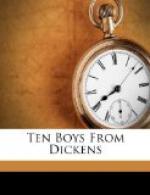“And now,” said the schoolmaster, dividing the bread and butter for three into as many portions as there were children, “you had better look sharp with your breakfast, for the horn will blow in a minute or two, and then every boy leaves off.”
Permission being thus given to fall to, the boys began to eat voraciously, and in desperate haste; while the schoolmaster (who was in high good humour after his meal) looked smilingly on. In a very short time the horn was heard.
“I thought it wouldn’t be long,” said Squeers, jumping up and producing a little basket from under the seat; “put what you haven’t had time to eat, in here, boys. You’ll want it on the road!”
Nicholas was considerably startled by these very economical arrangements; but he had no time to reflect upon them, for the little boys had to be got up to the top of the coach, and their boxes had to be brought out and put in, and Mr. Squeers’s luggage was to be seen carefully deposited in the boot, and all these offices were in his department.
Presently, however, the coach was off, and they had started on their long trip, made doubly long by the severity of the weather, which caused them to be detained several times; so it was not until six o’clock the following night, that he and Mr. Squeers, and the little boys, were all put down together at the George and New Inn, Greta Bridge.
“Is it much farther to Dotheboys Hall, sir?” asked Nicholas, when they had started off, the little boys in one vehicle, he and Mr. Squeers in another.
“About three mile from here,” replied Squeers. “But you needn’t call it a Hall down here. The fact is, it ain’t a Hall,” observed Squeers, drily.
“Oh, indeed!” said Nicholas, whom this piece of intelligence much astonished.
“No,” replied Squeers. “We call it a Hall up in London, because it sounds better, but they don’t know it by that name in these parts. A man may call his house an island if he likes; there’s no act of Parliament against that, I believe?”
“I believe not, sir,” rejoined Nicholas.
Squeers eyed his companion slily at the conclusion of this little dialogue, and finding that he had grown thoughtful and appeared in nowise disposed to volunteer any observations, contented himself with lashing the pony until they reached their journey’s end.
“Jump out,” said Squeers. “Hallo there! Come and put this horse up. Be quick, will you!”
While the schoolmaster was uttering these and other impatient cries, Nicholas had time to observe that the school was a long, cold-looking house, one story high, with a few straggling outbuildings behind, and a barn and stable adjoining. Mr. Squeers had dismounted, and after ordering the boy, whom he called Smike, to see to the pony, and to take care that he hadn’t any more corn that night, he told Nicholas to wait at the front door a minute, while he went round and let him in.




